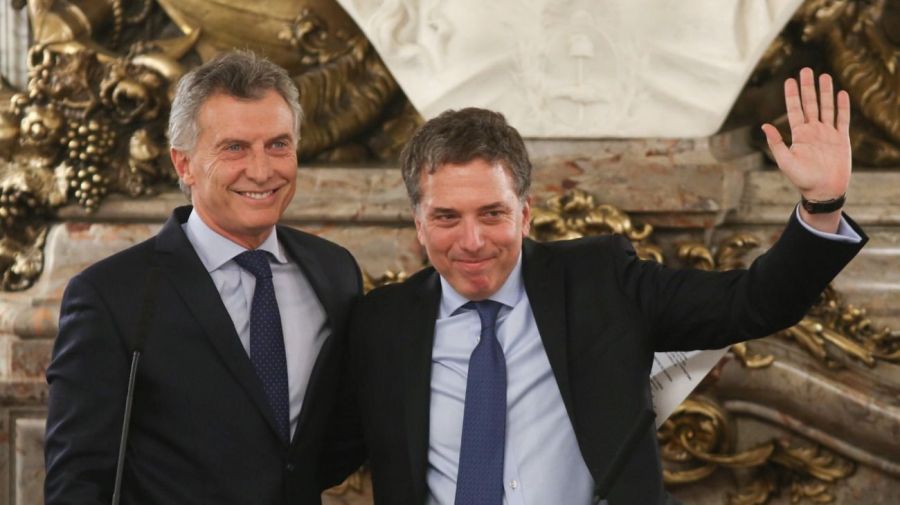After an extremely long silence, Nicolás Dujovne returns to the political scene.
The former economy minister of the Cambiemos administration aims his fire at the rescheduling of private debt as the main error of the Frente de Todos government, affirming that today’s society is prepared to make the effort implied by the structural reforms needed to heal the economy.
I recently heard a statement of yours that they [the current government] rescheduled a debt which should not have been rescheduled, that it should have been done differently. How should it have been done?
I was referring to the dollar debt with the private sector. When the Alberto Fernández government took office, they rescheduled our debt and the results of that have been very bad. Today Argentina is out of the markets with a country risk topping 2,000 points. So Argentina is evidently being punished for that rescheduling because the markets perceive that there is far more of a lack of will to pay than capacity to pay. A rescheduling which was announced during the campaign, which was one of the causes of the debacle following that Black Monday after the [2019] PASO primaries because the day after PASO Argentine assets fell 50 to 60 percent in price. And they were not wrong because they kept falling, previewing the economic misrule which would follow.
Within that, the rescheduling of the dollar debt where Argentina gave itself four years without any amortisations and practically without paying any interest with the deadlines for redemption all beginning to fall in 2024, 2025, 2026 and 2027, but without any fiscal preparation for meeting those payments. Argentina’s rescheduling was thus requesting a stay of execution with a huge capital and interest holiday where the bondholders would not be receiving any remuneration for many years while leaving the payment deadlines to 2023 and the next administration (whatever its party colours) along with a gigantic fiscal deficit.
There was evidently a planning error reflected in this sky-high country risk, which means that today Argentina can only finance itself by printing money or via the local capital market, which is very small. We thus see it as a great error to underestimate external sources of financing as necessary for a country which still has tiny capital markets.
And regarding the debt to the International Monetary Fund (IMF), this year it would have been necessary to pay almost US$20 billion and a further US$20 billion next year. Do you think that was payable or would those payments have had to be postponed?
It is evident that if we had still been around in these years with a strong budget surplus, the fiscal position would have been different since pre-PASO country risk was around 700 basic points and that simply because there existed a relevant probability that Kirchnerism could win the elections, otherwise it would have been 300 to 400 points as it was in 2017. Thus a big part of the IMF programme would have been payable with placements in the private sector. But it is also clear that we were going to replace our stand-by with an extended fund facility once the time came so that it is evident that we were going to have new and longer periods for reimbursing the IMF. Those are the usual dynamics for any country which has a programme with the IMF.
So you’re saying that in the case of the debt with the IMF you would have switched programmes so that the payments would have been rescheduled anyway.
That’s right, not the payment deadlines without new remittances because the IMF does not reprogramme deadlines but a new programme of loans in line with the expiry dates.
[Ex-Central Bank governor Federico] Sturzenegger said in this same series of interviews, and I quote: “The prevailing logic in 2018 was basically that there was a problem of liquidity and that we were heading towards fiscal convergence and recovering confidence by reordering the accounts so that in two years we were going to incur private debt to pay off the IMF.” By the same token you were taking debt from the IMF to pay off the bondholders and avoid default. From that perspective, was it plausible to think that you were going to be able to generate confidence?
Argentina’s programme with the IMF was pretty similar to Portugal’s where the minister was Mario Centeno. That was an example of success with a fiscal effort like ours, only that it was not interrupted by a change of the party in government. Our programme was similar to Egypt’s in terms of being fiscally correct but what happened is that there was political continuity there. What Uruguay did in 2003 was also similar.
The most important component of the programme with the IMF was convergence, first primary balance and then surplus, which is what Argentina needed. The fiscal objectives set by the IMF were all met and that was highlighted in the posterior evaluation published by the IMF some month ago, underlining that fiscally the programme worked. So if you look at Argentina’s recent past with episodes of shock in the balance of payments as we had in 2018 when we suddenly found ourselves still with a high fiscal deficit and trade gap. For some reason rising interest rates in the United States led to a co-ordinated capital flight from emerging markets. To that you would have to add drought in Argentina but it affected the countries which were in the most fragile situation: Argentina, Turkey and a few others. Now typically in the course of a year you do what you have to do, which is to let the currency float, depreciate the exchange rate, impose positive real interest rates and adjust fiscally. A year later you begin to see the results, inflation starts to dip and financial dollars are replaced by commercial dollars because you pass from a trade deficit to surplus while the financial dollars begin to return along with the confidence, turning both the fiscal and external situations around. And if you look at 2019, we were there: July inflation just before the elections was 2.1 percent, still very high, but the first fortnight of August was running at one percent with a strong trade surplus and an ultra-competitive exchange rate. We needed to go building from that point. And that’s what happened to the countries which did not completely reverse their policies. I’ve already mentioned Portugal, Egypt and Uruguay to you – there are many more and it was a chance lost for Argentina, not Cambiemos or Juntos por el Cambio.
Because imagine Alberto Fernández as a candidate saying: “Look here, guys, this Macri is into neoliberal austerity and together with Dujovne they are lowering spending and we don’t believe in that so we’re going to continue with a programme of convergence towards fiscal balance because we have to halt the issue of debt but we’re going to do it by raising taxes.” Many people would not have liked it but we would not have had the market upheavals we had, the loss of value and the destruction of the collective construction made by Argentine society in the previous two or three years in terms of healthier fiscal accounts and convergence towards a floating exchange rate at levels permitting a trade surplus. So I see it as a wasted opportunity because even with condiments of a different political vision, Argentina could have stayed on the path of converging towards fiscal balance.
The aim of reviewing the past is not self-flagellation but trying to learn and draw conclusions which serve us to improve in the future. I hear your discourse and I’ll now read to you another very similar paragraph from Federico Sturzenegger in that same interview: “The government had taken a gradualist approach to deficit reduction and for different reasons it had a crisis of confidence, the Treasury had problems financing and when you have that problem, which is not a problem of solvency but a problem of liquidity, of rollover, you make a decision – either you default or you seek somebody else to finance me.” And the question I asked him was how many years or decades of not rescheduling would it take for Argentina to recover its institutional credit because it has already rescheduled so many times. Are you saying that there would have been a rapid recovery?
There would have been, confidence was recovering via the improvement in the fiscal numbers and, of course, it was crucial not to reschedule the debt.
If politics generated a risk of the opposition winning and that risk was within the probable, not just the possible, obviously affecting the economy, and that opposition already had a track record and a known hostility to fiscal balance, weren’t you staking everything on a single card?
That’s an interesting dilemma and I’ve thought about it a lot in these past two years since the end of our administration. It’s as if one should govern differently, given that the opposition has different ideas and dialogue with Kirchnerism was very difficult and remains so. Now that within the same administration they are not talking to each other, I rewind and say ‘no, we had to go our own way.’ It’s as if I’d said that in case Kirchnerism wins, I’ll intervene in the INDEC [statistics bureau] for a softer landing because they’ll only falsify the statistics so I might as well falsify them now. I don’t think Argentina should have defaulted in 2018 when there was a flight of capital just because Kirchnerism was eventually going to do it later. No, we had to show our vision of the world, our vision of the economy, how to construct a prosperous country.

If I interpret you correctly, you’re saying that you had to build for 2023 in 2018, even while losing the elections in 2019, you had to construct credibility for when Juntos por el Cambio made its comeback .
No, Argentina needs to construct credibility and needs many years of not rescheduling its debts, of honouring its contracts.
Even supposing that Argentina does not reschedule its debt, I think you’ll agree that it will take many years for private credit in Argentina to regain credibility.
That depends on the fiscal situation because it is true that Kirchnerism has its propensities.
Not just Kirchnerism, [Domingo] Cavallo had to battle against deficit during convertibility, the problem of the fiscal deficit in Argentina is chronic, even under military dictatorships.
Yes but society [today] clearly has low tolerance.
It is correct that Kirchnerism increased public spending by 20 points [of gross domestic product].
But in a society with low tolerance for debt and with respect for contracts, what Argentina needs is an extraordinarily huge fiscal surplus. In that sense it worries me that all the current discussion centres on what we have to do to return to primary balance. And the truth is that Argentina needs, like [Luiz Inácio] Lula [da Silva]when he took office in Brazil with a massive credibility gap, the four points of primary surplus which he maintained throughout all his first term, demolishing Brazilian debt in that period. Brazil’s fiscal solvency started to slip in Lula’s second term but it was essentially Dilma Rousseff who turned a primary surplus of two or three points into a deficit of two or three points. It was a fiscal disaster but it was Dilma Rousseff, not Lula.
My point here – I’m rambling a bit – is that Argentina needs a really huge fiscal surplus to make us all forget the risk of rescheduling so that we can forget the risk of rescheduling and the debt can start to be genuinely reduced and not because we invented some trickery. Then we can all concentrate on our relevant business, you on your multimedia and your newspaper so you do not have to go wondering whether the government is going to pay up or not tomorrow with the same applying to any company which produces goods or services of any kind. So in order to have a calm economy where productivity can grow – and the only way wages can rise is if productivity grows – we have to take away the macroeconomic risk. And given the intolerance to debt and respect for contracts which we have as a society as a whole, we need a very high fiscal surplus and that, of course, is not magic. It requires an adult discussion among all ourselves over how we can return to a reasonable level of public spending because the level we have today cannot be financed.
Would you criticise the IMF or was your margin of negotiation with them limited?
That’s a very interesting question and there are various issues to discuss here. In 2018 inflation was close to 40 percent without repressing public service pricing. In other words we were maintaining the convergence towards equilibrium since we were not halting the convergence of public service pricing towards equilibrium with a free exchange rate. That way exporters could draw some benefit and finally end up creating more jobs. And, of course, with a major monetary squeeze, we set an objective of zero expansion of the money supply.
As you well know, there are lags in monetary policy which are seen further down the road. Thus that inflation we had was high and painful but it was a macroeconomically healthier inflation than the one we have today when we are already running at an annual rate of 80 to 90 percent inflation with frozen public service billing, a semi-frozen exchange rate and capital controls. Simply because we have a gigantic fiscal deficit, no credibility and money is being printed…
It might be assumed that inflation would go down afterwards but the elections were lost.
The programme was very sustainable from the economic viewpoint but lacked political sustainability. It had to have something working better politically in order to be able to win elections. The IMF does not dedicate itself to assembling programmes so that governments can win elections. So if anybody accuses us of electioneering, nothing doing. We designed healthy macroeconomic policies without shortcuts and that evidently may have been electorally costly.
You recently said that wages had lost ground against inflation due to bad economic policies and not having a consistent programme, referring to current losses. Given the 20 percent loss in real wages during the four years of the Macri government, in great measure between 2018 and 2019, I would ask you again: was that the electoral detonator?
Beyond any doubt, the main factor explaining the electoral performance of a government swinging votes one way or another has plenty to do with real wages. The fall in the real wage was not an objective sought by the programme, it was the consequence of the external adjustment to which the economy saw itself submitted. With capital flight the economy has to accommodate itself to a higher exchange rate [for the dollar] and that leads to a transitory surge in inflation, which, of course, was going to be reversed later on. But well, it took time and finally did not happen as a result of the electoral defeat.
You have said that it is weird hearing Central Bank Governor Miguel Pesce or any other Central Bank official naming the word inflation. Is that because inflation is a necessary and even desirable tool within this economic plan?
Today’s economic programme of the Alberto Fernández government is an inflationary programme.
What is your forecast? You have said that neither the deficit nor the printing of money is going to come down while inflation will keep on climbing. What is your estimate of next year’s inflation?
I think it’s going to be in three digits, unfortunately.
Next year.
Yes, unfortunately. The liquidation of harvest earnings will end after August. The government is not managing to accumulate reserves in a context of the best terms of trade since World War II and even then it is unable to buy reserves. Exports, which were US$75 billion last year, are leaping up to US$91 billion this year with prices accounting for almost all of that. It’s an enormous positive shock and even then they cannot buy reserves because the flight from the peso, monetary expansion and negative real interest rates lead to all the private sector trying to buy imports, which are valued at the official exchange rate. In August the harvest earnings will be finally liquidated.
From the way Kirchnerite governments work in general, hanging onto the official exchange rate all they can, there are sure to be many quantitative restrictions on imports as from the end of the harvest season. When that occurs, there will be less supply of goods so that with the same demand there will be pressures to raise prices. But on the other hand, the main genuine mechanism for sterilising pesos today is the purchase of dollars to buy imports. So if I lower imports by one or two billion dollars, there are 300 to 400 billion pesos which have not been withdrawn from the market to buy imports and that will probably pressure my exchange rate gap. And again, the local capital market is tiny so we have two alternatives – either print money or issue bonds in pesos when there is no market to absorb all these excess pesos. That’s the musical chairs at the moment. The Central Bank issues many pesos to pay the interest rates on the Leliq bonds. The Treasury prints many pesos because the deficit is very high and there is a sacred mantra that real interest rates must be negative. Well, it’s very difficult. That’s an inflationary programme.
You said: “More structural reforms were missing, we were thinking of introducing them in our second term once we had been endorsed by the citizenry and had better parliamentary numbers,” adding in a much commented remark: “We suffered a transitory (sic) detour and as from 2023 we’ll see the structural reforms which we could not do in the first term.”
If we think like the Chinese, history is not four or eight years. Some things remained from the 2015 to 2019 experience. It showed a different way of governing and we managed to keep the coalition united. Many of the reforms we did not put through were not only because we were minorities in both chambers but also because they did not pass the filter of all the governing coalition. The priority then was to keep the governing coalition united and that mechanism was very well-oiled.
When you see the chaos and lack of control of this administration, you begin to value how our administration worked. It was very organised in terms of decision-making and consulting the other parties forming the governing coalition. Every time we had to take an important decision, it had first to be endorsed – by the president himself, of course, the Cabinet chief, the president’s inner circle and then our allies, that’s how it worked. And if it did not pass that filter, it was amended until it could pass.
Of course, you might say that many reforms did not see the light of day. This explains in large measure that there were no authoritarian advances during this government because the coalition was preserved and constructed. It stands firm over and above the disputes today to see who heads the presidential ticket, which is natural enough in a political party and which we will have to get used to. Having left this coalition united is a great legacy.
What did you learn when you drew a balance of your time in public life? What did it leave you? How different a person is this Nicolás today from the one before?
I’m another person, of course. Wiser, less arrogant and understanding the need to talk to other people. That is to say you enter public life thinking that you are going to take such and such a measure and that you are going to beat that person and this to it – that does not exist when you have to think of the rebound effects B, C and D and talk to the interested parties to construct some kind of consensus. So I’ve become a person who listens much more and who has learned that the years do not go by in vain.
Production: Sol Bacigalupo and Natalia Gelfman.





















Comments